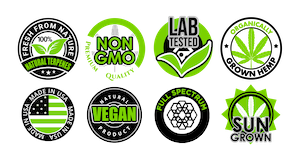What is CBD?
Cannabidiol (CBD) is a chemical compound that comes from hemp plant. It is one of over 85 unique compounds found in hemp, known as cannabinoids.
Cannabidiols and Human Body :
Cannabinoids, which can be either consumed (phytocannabinoids) or produced naturally by the body (endocannabinoid), are chemical compounds that interact with the body’s central regulatory system (the endocannabinoid system). This system is known to manage homeostasis and affect bodily processes such as appetite, mood and sleep.
CBD is an example of a phytocannabinoid. Although our bodies can naturally produce its own endocannabinoids that bind to cannabinoid receptors in both the central nervous system and the peripheral nervous system, phytocannabinoids help to kickstart our central regulatory system and provide powerful benefits.
Our body’s endocannabinoid system was found to be directly involved in the processes that keep our bodies balanced day to day, including: appetite, pain sensation, mood, memory, immune system functions, and inflammation control. Essentially, the system helps to manage homeostasis, balancing our body’s natural conditions. This system is made up of receptors that are located in the brain and nervous systems throughout the body.
The body creates its own cannabinoids, called endocannabinoids, to help support this regulatory system. CBD supplements these naturally created endocannabinoids to keep the receptors working at optimal capacity. Similar to how we use vitamin C to kick start our immune system, CBD acts as a kick starter to help the functions of the body’s central regulatory system.
Where does the CBD comes from?
CBD is extracted and separated from specific varieties of cannabis. It is the second most abundant compound in cannabis, typically representing up to 40% of its extracts. CBD is a compound that can be found in both psychoactive cannabis (marijuana) and non-psychoactive cannabis (hemp). However, most legal CBD products that you find on the market will be extracts from hemp.
Is CBD Legal ?
Federal law allows for the cultivation, processing and marketing of hemp and hemp products, which would include cannabinoids derived from industrial hemp. Passed by Congress and signed into law by the President in 2014, the Farm Bill permits the growth and cultivation of industrial hemp in states where hemp is legal to grow. (Section 7606 of the Agricultural Act of 2014)
Under U.S. federal law, industrial hemp products (containing less than 0.3% THC) can be commercially shipped to all 50 states.
Can you get high from using CBD?
No, CBD is not a psychoactive product.
Can you overdose on CBD?
No, there are no documented cases of CBD overdose.
Are there negative side effects of CBD usage?
There are no documented clinical evidence that CBD usage has negative side effects.
Will CBD use make me fail a drug test?
Depending on the origination of the CBD products, the drug tests results may vary. If a customer is undergoing the regular drug testing, we advice them to stay away from the CBD products made from full spectrum CBD oil and use products that are made from CBD Isolate.
Third party testing
All our products undergo several levels of testing. Hemp is initially tested on the farm, then all products and raw materials are sent to the third-party reputable lab.
Please see attached lab results for every product.
What kind of CBD source is best for you ?
Isolate- 99.99 % pure CBD crystals, will not show up on drug test, but lacking entourage effect.
Broad spectrum – THC amounts are reduce to almost 0 , still has all other cannabinoids, terpenes and flavonoids of hemp plant, will not show up on a drug test.
Full spectrum-contain all cannabinoids, terpenes and flavonoids of hemp plant ; THC levels are in compliance with federal law. Since there are some THC in full spectrum products it might show up on a drug test, hence user should know which product (isolate, broad spectrum or full spectrum) would work best.
Raw Hemp Powder
Hemp leaves and flowers are juiced and then dry frozen. Raw powder contains all vitamins, fibers, chlorophyll, flavonoids, terpenes, and cannabinoids as raw hemp plant. It contains CBDa, THCa, CBGa. These are acids that are precursory to CBD, THC, and CBG. Heat must be applied in order for acids to be transformed into CBD, THC, and CBG. Raw Hemp powder is water soluble, hence absorption rates are much higher than in oil soluble CBD.
How to take CBD and suggested dosage?
Consult your physician before taking any supplements. Not intended for usage for pregnant and nursing women.
User can choose how they would like to consume CBD. There are Pros and Cons to every method of consumption.
Smoking or Vaping :
Offset: 5min
Exposure to open flames will destroy terpenes and smoking in general is not the healthiest practice.
Tincture:
Offset: 20 min
User takes few drops of tincture under tongue. Best for consumers who look for entourage effect because terpenes and flavonoids are intact.
Edibles :
Offset: 30-40 minutes .
In general users will wait longer for the CBD to work after consuming edible products , also significant amount of CBD is lost during traveling through the digestive system. But the effects last longer and this method of consumption is great for overnight relief.
Topicals:
Offset- 30 min
Great for managing localized topical pain because skin has lots of CB1 and CB2 receptors. Topical product should contain large amounts of CBD as well as some emulsifiers (lecithin) to increase the absorption and minimize waste.

